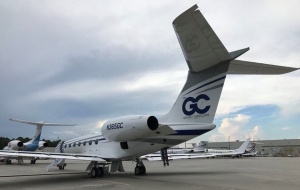Headaches of Commercial Travel & How These Executives Guarantee On-Time Arrival

In an age where business is driven by technology, the days of inaccessibility seem to no longer exist. Getting ahead of text messages and emails are nearly impossible and the fleeting demands of corporations leave us glued to our smartphone devices. The need to travel in an instance has become a necessity yet traveling commercially has grown into an atrocity. With companies such as Apple spending approximately $600M annually in total travel costs, efficiency and certainty seem to surpass the expenditure. Additionally, traveling commercially is filled with anxiety and anticipating tarmac delays, gate changes, and cancelations seem to add to most travelers’ frustrations. By the same token, impolite TSA and invasive security measures appear to disregard public privacy.
In March 2019, reporting marketing carriers posted an average of 19.1% flight delays. These numbers did not include tarmac and taxi delays, which add significant setbacks to the overall flight time. Commercial airlines also add a fair amount of buffer time to their travel schedules. By example, Delta Airlines allows a flight time of 6 hours and 20 minutes from New York’s JFK to Los Angeles LAX, compared to the actual flight time of 5 hours and 21 minutes on a private jet charter. Essentially, airlines pad their flight schedules to boost on-time records. According to the US Department of transportation records, only one in five domestic flights on major airlines arrive at the gate on schedule. Scheduled flight times measure a trip from the departure gate to the arrival gate, not by flying time. A flight from New York JFK to Los Angeles International is one of the busiest US routes and is now scheduled to take almost an hour longer on average then in 1988. Often passengers are kept waiting for upwards of 30 minutes for an arrival gate to become available.
Research conducted by the global leader in connecting business travelers, found a staggering 93% of travelers felt stressed at some point throughout their journey. When surveying the top business professionals, dependability seemed to outweigh the cost of private travel. Real estate developers, money managers, and entrepreneurs alike, depicted how valuable private travel has been to their lifestyle and business. A one-way chartered flight from Los Angeles to New York can cost anywhere from $30,000 to $50,000. One would imagine these business professionals would prefer to travel commercial first class. Yet, these individuals choose to pay the additional surcharge to guarantee they leave whenever they want and arrive on time to their destination. Executive board member of Marriott/Starwood Hotel Group, Jonathan Lifshutz stated, “Think of the premium you pay for private travel as an insurance policy that you’ll arrive on time to your destination.” Lifshutz, also owner of several Marriott hotels, has been traveling privately to guarantee stress-free travel and allows the flexibility to balance his busy schedule.
Private travel initially was only afforded to the ultra-high net worth but has now become widely accessible for affluent individuals and families. Private charter has become vastly economical compared to a decade ago. Fractional ownership models and jet cards have been replaced with readily available, on demand uber-like, ride sharing platforms such as “SurfAir” and helicopter startup, “Blade.”
President Trump has also assisted with increasing aircraft acquisitions since the passing of his 2017 tax bill, which allows for a 100% depreciation in the first year of purchasing an aircraft. A bill that had previously allowed only a 20% depreciation each year, over a five-year period. Entrepreneur and real estate mogul, Grant Cardone, who owns a 2017 Gulfstream 550 said, “Private travel has improved the quality of my life and business by 10X.” Cardone controls roughly $800 million in real estate and is a best-selling author. Considering several factors from cost to convenience, the world of private charter is still reserved for those who can afford it.
Private Aviation owner of M2Jets Moshe Malamud, who’s aviation company handles jet travel for the Hollywood elite and uber-wealthy explains, “Having the privilege to fly whenever you want, wherever you want is simply priceless. It takes the stress out of travel and allows passengers to be in complete control of their schedules.”
In most metropolitan areas, business executives, money managers, and entertainers, flood the local FBO’s. Arriving ten minutes prior to departure and being chauffeured by blacked out SUV’s to the foot of the aircraft. Bypassing security checkpoints and airport traffic, these people understand how critical it is to be in the air moments after arriving to an airport. Los Angeles based asset manager; Lorenzo Esparza claims private travel has taken his business to new heights. Previously a top advisor at JP Morgan for 15 years before starting his own firm, Manhattan West Asset Management, Esparza explains, “When managing high net worth’s financial affairs, availability and privacy is prudent. There may only be 24 hours within my client’s schedule to review and execute a business opportunity. Being available to our clients immediately with proprietary solutions is what separates us from other wealth management firms.”
While commercial air travel continues to fight to maintain diplomacy, technology and social media have created other verticals to take advantage of. More millionaires and billionaires have been created in the last two decades than ever before. For those who can afford to pay thousands of dollars for a one-time trip, they will continue to take advantage of private air travel. For the general public, however, long security lines, canceled flights, and acts of ignorance will persist.
As with any type of public transportation, coordinating logistics is extremely cumbersome and intricate. In the coming years, the success of commercial air travel is dependent upon discovering new solutions to accurately predict travel times, limit harassing security measures, and avoid untimely interruptions throughout a travelers’ trip from start to finish.
In the meantime, business travelers of means will continue to seek alternative stress-free transportation with more reliability such as private travel.

